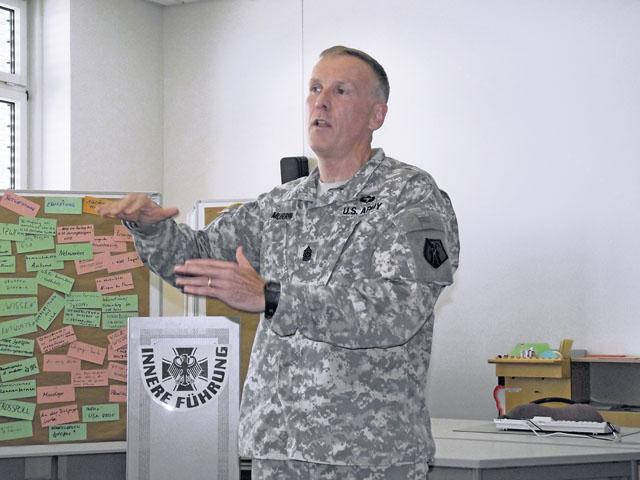
The 21st Theater Sustainment Command’s senior enlisted adviser discussed Army force structure, the role of the American Soldier and the vital importance of the U.S.-German partnership with a unique group of junior officers Aug. 28 at the Center for Leadership Philosophy in Koblenz.
Command Sgt. Maj. Jim Murrin said he felt a little nervous prior to his presentation. After all, the Boston native arrived in Germany only two months ago. His German consists mostly of greetings and menu items, and the presentation marked his first international speaking engagement. The junior officers were Germans.
The sergeant major discussed Army force management fundamentals, composition, command and rank structure with the captains and lieutenants, all completing a course of study designed to produce well-rounded and well-informed “information officers.” Murrin talked big missions and small, quality of life, recruiting and retention. The sergeant major punctuated his presentation with personal anecdotes and observations, which attracted keen interest from the students.
Murrin also emphasized the importance of the U.S. alliance with Germany and the uniquely warm relationship between Americans and Germans. He highlighted the strategic significance of the national bond as well as the cultural dimension of the relationship, noting to the students’ delight that most Soldiers consider Germany a highly desirable assignment.
The sergeant major closed with a discussion of the Army’s values, which he described as fundamental to the identity and mindset of the American Soldier.
“The American military and the American Army are value-based organizations,” he said. “These values are fundamental to who we are and what we believe. They frame everything we do. They guide us in all our behavior, whether we’re on or off duty.”
The students queried the sergeant major throughout a lively interactive session. The aspiring information officers asked about such weighty matters as budgets, U.S. public opinion during the wars in Afghanistan and Iraq, and reserve component training for operational missions. They asked even more frequently about human interest topics, including American Soldiers’ favorite assignment locations, their opinions of Germany and whether or not Murrin attempted supersonic speeds on the world-famous autobahns.
The students received the sergeant major’s observations and anecdotes warmly, pounding their tables appreciatively after the presentation. In the aftermath of the brief, several students applauded the sergeant major’s authenticity, honesty and human touch.
“It was really good for us, because it gave us deep insight into the structure and the reason behind it,” said German Capt. Andreas Mertens, a youth information officer from Trier, after the presentation. “I found the personal opinions very interesting. He expressed a very deep identification with the U.S. military forces, and that helps us understand how (Americans) function. This gave us good insights into how (Americans) think and act.”
German Capt. Patrick Rohmann, an information officer assigned to the Ruhr town of Unna, said he learned “U.S. sergeants major are very proud of what they’re doing. I found his presentation quite authentic.”
“I did not realize the U.S. Army is so big,” he said. “I also found the branch system very interesting. An American officer can achieve high rank in a single branch. That’s good.”
German Navy Cmdr. Sebastian Vagt, a youth information officer from Berlin, said it was good to have the emotional side.
“It was most interesting to us to see how the American Soldiers are motivated.”
Air Force 1st Lt. Manja Wollweber, also an information officer from Berlin, said it is easy to read about the structure and the composition of the Army.
“But (Murrin’s) personal stories were very interesting,” Wollweber said. “It’s particularly interesting to hear what motivates the American Soldier to join the military and remain in the military.”
The presentation reflects the dynamic German-American partnership, which extends to professional dialogue, training and mentorship as well as coordination and combined planning.
Lt. Col. Alexander Willing of the Bundeswehr Academy for Information and Communication, the chief event organizer, described the class as a “culminating course” for new information officers. Students’ curriculum includes a sequence of specific classes, professional forums and even a trip to the U.S. conducted over a period of nine to 14 weeks. Graduating captains and lieutenants serve as information officers under the ministry of defense and public affairs.
“This is a preparatory course for our information officers,” Willing said. “The course covers many aspects of leadership philosophy.”
Willing emphasized the importance of learning from, with and about his country’s American allies.
“As the U.S. is our biggest partner, it’s important to understand how they see the world,” he said.
The toughest questions Murrin faced dealt with national security policy and defense strategy. The sergeant major emphasized the importance of allied partnership and its role in deterrence.
“It’s difficult to measure the value of what doesn’t happen,” he said. “But that can be the best measure of success.”
Murrin also emphasized the historically unique and vital role of citizens serving in a volunteer military and the common professional bond among allied service members.
“We are all brothers and sisters in arms,” he said. “We share a common bond, not only because we’re allies but because we all volunteered to serve our counties in a free society. I’m sure the more we talked, the more we’d realize we have a great deal in common.”


